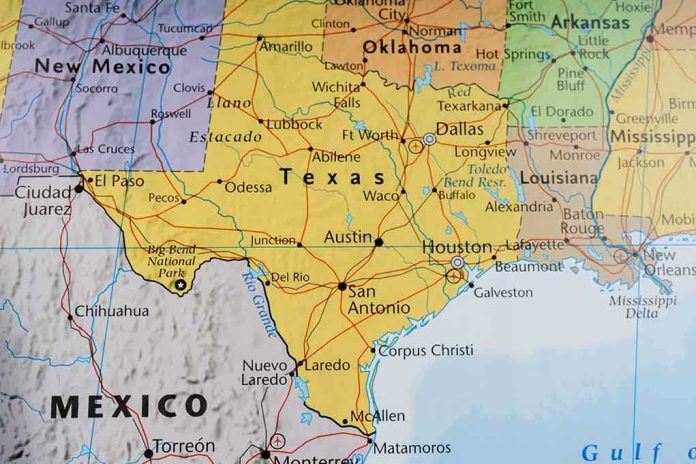
Mexico’s president’s flat rejection of Trump’s call for U.S. military strikes against drug cartels has reignited fierce debate over America’s right to defend its border—and the ongoing threat posed by unchecked cartel violence spilling into U.S. communities.
Story Snapshot
- Mexico’s President Claudia Sheinbaum bluntly rejects Trump’s proposal for U.S. military action against cartels.
- Trump’s renewed push for cross-border strikes highlights U.S. frustration with cartel-driven drug and violence crises.
- The standoff exposes deep rifts between American security needs and Mexican sovereignty claims.
- Experts warn unilateral U.S. action could destabilize relations and worsen violence, but border communities demand real solutions.
Trump’s Bold Stand for American Security Meets Mexican Resistance
On November 18, 2025, former President Donald Trump reignited the national conversation on border security by publicly supporting potential U.S. military strikes against drug cartels operating in Mexico.
Citing the escalating flow of deadly narcotics and the violence endangering American families, Trump declared he would not hesitate to authorize action if it meant protecting U.S. citizens.
This tough posture reflects ongoing frustrations among American conservatives who have seen past administrations fail to stem the tide of drugs and chaos pouring over the southern border.
Within hours of Trump’s remarks, Mexican President Claudia Sheinbaum issued an unequivocal response, stating, “It’s not going to happen.” Her categorical refusal to consider foreign military intervention underscored Mexico’s long-standing insistence on defending its national sovereignty, even as cartel violence continues to claim thousands of lives each year.
The sharp exchange has placed U.S.-Mexico relations under intense scrutiny, with border-state Americans watching closely and demanding that their government take decisive steps to halt the devastation wrought by transnational criminal organizations.
Historical Tensions Over U.S.-Mexico Security Cooperation
Calls for direct American intervention in Mexico are not new. For decades, the U.S. and Mexico have engaged in joint efforts against drug cartels, but always under strict limitations respecting Mexico’s command and sovereignty.
In 2019, Trump threatened to designate Mexican cartels as terrorist organizations, a move that would have vastly expanded America’s authority to act but was ultimately rejected by both Mexican officials and international observers.
Despite numerous joint operations and intelligence-sharing initiatives, cartel violence escalated during the past decade, and the opioid crisis in the U.S.—fueled by illicit fentanyl from Mexican sources—shows no signs of abating.
As Trump returns to power, his administration faces mounting pressure from border communities and conservative voters to deliver real results. The failure of previous “woke” policies, which prioritized globalist diplomacy over national security, has left many Americans skeptical of solutions that rely solely on international cooperation.
Trump’s renewed push for cross-border military options signals a willingness to challenge diplomatic norms in favor of defending American lives and restoring order to lawless border regions.
Diplomatic Standoff and the Debate Over Sovereignty Versus Security
The immediate fallout from Sheinbaum’s rejection has been a diplomatic standoff, with no formal military action proposed but heightened tensions dominating headlines. For conservatives, the Mexican president’s refusal to even discuss joint military efforts is seen as a blatant disregard for the suffering of Americans victimized by cartel-driven crime.
Critics argue that Mexico’s insistence on sovereignty, while understandable, cannot come at the cost of American safety. There is growing concern that political correctness and appeasement of foreign leaders have hamstrung America’s ability to take the bold steps required to dismantle powerful criminal networks operating just across the border.
Security analysts and diplomatic experts caution that unilateral U.S. military intervention could destabilize Mexico and trigger unintended consequences. However, many American families—especially those in border states—are less concerned with international protocols than with the relentless violence and drug trafficking threatening their way of life.
The debate highlights a core tension: the balance between respecting another nation’s sovereignty and fulfilling the federal government’s duty to protect its own citizens from external threats.
Impact on Policy, Communities, and Conservative Values
The standoff has immediate and long-term implications for U.S.-Mexico relations and America’s ongoing struggle to defend its borders. Short term, diplomatic friction is likely to intensify, with protests and political mobilization possible on both sides.
Over the long run, Mexico’s hardline stance may chill security cooperation, embolden drug cartels, and fuel nationalist rhetoric. Border communities—already bearing the brunt of cartel violence—will continue to demand action and accountability from Washington.
For many in the conservative movement, this episode is a stark reminder of the need to prioritize American interests, restore constitutional protections, and reject policies that empower criminal organizations or erode national sovereignty.
While expert consensus currently favors enhanced intelligence sharing and economic support over direct strikes, the growing frustration among voters may soon force policymakers to reconsider what options are truly on the table to keep America safe.
Sources:
Mexican President Rejects Trump’s Offer of U.S. Military Intervention Against Cartels
Trump reacts to Mexico City, says military strikes ‘OK’







